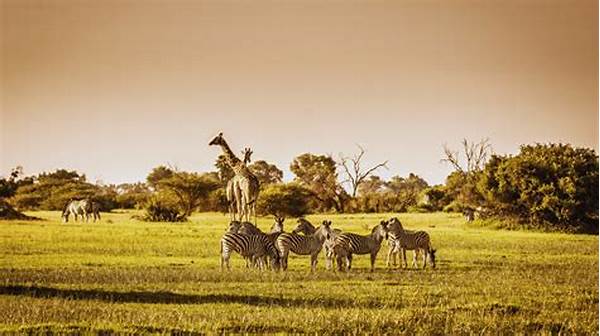- The Essence of Ethical Wildlife Encounters
- The Impact of Responsible Tourism
- How to Join the Movement
- Why Choose Ethical Wildlife Encounters?
- Introduction to Ethical Wildlife Encounters
- What Makes a Wildlife Encounter Ethical?
- Highlights of Ethical Wildlife Encounters
- Why Ethical Wildlife Encounters Matter
In the ever-evolving world of eco-tourism, ethical wildlife encounters in natural areas have become a cornerstone of responsible travel, offering unforgettable experiences while ensuring the safety and preservation of wildlife habitats. Imagine wandering through lush jungles, accompanied by the enchanting calls of exotic birds, all while knowing that your presence sustains the delicate balance of this ecosystem. Intrigued? Let’s embark on a journey to explore the significance of these encounters and how they not only enrich your travel experience but also contribute positively to the planet.
Read More : Natural Caves And Underground Tourism Experiences
The Essence of Ethical Wildlife Encounters
Ethical wildlife encounters are not mere trends; they are the future of sustainable tourism. With increasing awareness of environmental degradation and the role humans play, it’s crucial that travelers engage with nature responsibly. Picture this: You’re trekking through the vast African Savannah, your heart racing as you witness a herd of elephants moving gracefully across the plains. This isn’t just a sight to behold; it’s an opportunity to learn, grow, and contribute to a cause greater than yourself. Such experiences not only fulfill an adventurous spirit but also foster a deeper connection with the natural world, one that’s built on respect and understanding.
Choosing ethical tours ensures the preservation of wildlife and their habitats, reducing the disturbance to these magnificent creatures. Guided by experts, you gain insights into the behaviors and needs of the animals, ultimately cultivating empathy and awareness. It becomes not just a vacation, but a moving story to share—a personal testament to your commitment to conservation.
The Impact of Responsible Tourism
The ripple effects of participating in ethical wildlife encounters in natural areas extend far beyond your temporary adventure. These practices support local communities, providing them with sustainable income and incentives to preserve their natural surroundings. Imagine traveling to a remote village where the locals share timeless stories about their relationship with the environment. By choosing eco-friendly tours, you’re not just a tourist; you’re an ally in their fight for conservation and a part of their story, promoting an economy that values and protects biodiversity.
Economic benefits coupled with educational elements make these encounters a powerful tool for change. Witnessing animals in their natural environment sparks curiosity and questions which guides and experts happily address. This exchange of knowledge and culture ensures that the lessons you learn travel back with you, impacting your everyday choices and spreading awareness back home.
How to Join the Movement
So, how can you ensure your next trip includes ethical wildlife encounters in natural areas? Start by researching tour operators who prioritize conservation and animal welfare. Look for certifications from recognized eco-tourism organizations and read testimonials from fellow travelers who emphasize the significance of maintaining ethical standards. By making informed decisions, you become a guardian of the wild, joining a movement towards sustainable travel and adventure.
Join us on this journey where every step not only leads to awe-inspiring discoveries but also contributes to the global endeavor of wildlife preservation. Gear up for the adventure of a lifetime that promises not just memories, but a better tomorrow for our natural world.
Why Choose Ethical Wildlife Encounters?
In a world where tourism often walks a fine line between economy and ecology, ethical wildlife encounters in natural areas offer an alternative that embraces both. The tales spun in the heart of nature are not just entertainment; they are educational narratives that open your eyes to the real impact you have on the earth. Each encounter is a brushstroke on the canvas of conservation—a testament to a journey that’s fun, fulfilling, and fundamentally transformative.
Making a Lasting Impact
Choosing ethical wildlife encounters means opting for unforgettable experiences that honor both the animal kingdom and the communities that depend on it. Witness for yourself the breathtaking beauty of the wild while playing a vital role in its preservation. So, pack your bags and your sense of responsibility, and set off on an adventure that promises to leave a mark—on both you and the world.
By embracing ethical wildlife encounters in natural areas, you step into a world where every experience conveys a message, every sighting tells a story, and every choice makes a difference. Embark on this adventure and be a part of the larger narrative that ensures the wild remains magnificent, vibrant, and thriving for future generations.
—-
Introduction to Ethical Wildlife Encounters
Understanding the Importance
Ethical wildlife encounters in natural areas are more than just observing animals; they’re opportunities to engage with nature in a way that respects and preserves its integrity. From the majesty of whales breaching in pristine oceans to the curious gaze of a monkey in a dense forest, these interactions stir the soul. But what exactly makes them ethical, and why should you care?
The Ingredients of an Ethical Encounter
Key to understanding ethical wildlife encounters is recognizing what distinguishes them from other, less sustainable forms of tourism. Ethical encounters are characterized by a minimal footprint philosophy, where visitors are custodians rather than consumers of nature. Envision yourself on a bamboo raft gliding quietly down a river, the only sound being the rustle of the wind and the occasional splash of a fish. This tranquil passage through nature is achieved without disrupting the ecosystem, demonstrating the harmony possible between humans and the natural world.
Read More : Benefits Of Joining A Nature Community
The Global Viewpoint
Globally, people are awakening to the need for sustainable practices. Studies consistently show that when people experience animals in their natural habitat ethically, they are more likely to champion conservation efforts. A survey conducted by the Global Nature Travel Association found that 72% of respondents reported increased environmental awareness following ethical wildlife tours. These statistics underscore the necessity of incorporating ethical practices in tourism to foster informed and active conservation communities worldwide.
The Role of Local Communities
Engaging with local communities plays a crucial role in ethical wildlife encounters in natural areas. These communities often function as guardians of their local environments, possessing a wealth of knowledge born out of generations living in harmony with surrounding wildlife. By integrating community-based initiatives into your wildlife adventures, you support indigenous efforts to maintain ecological balance. Picture yourself sharing a meal with village elders who recount tales of the land, giving a face and story to the concept of conservation. It’s a powerful reminder that environmental stewardship is a collective journey, not a lone destination.
Navigating Ethical Wildlife Tours
Interested in embarking on one of these captivating tours but unsure where to start? The process is simpler than you might think. Selecting the right tour guide, ideally one certified in eco-friendly practices, sets the stage for a rewarding experience. Websites and organizations dedicated to eco-tourism provide invaluable resources and suggestions, ensuring you choose the best options aligned with your ideals. Trust in the wisdom of adequate research; ethical wildlife encounters in natural areas await you, ready to broaden horizons while treading lightly on the earth.
What Makes a Wildlife Encounter Ethical?
Key Factors to Consider
Choosing the right wildlife experience isn’t just about the “wow” factor—it’s about ensuring that your presence positively impacts both animals and local environments. An array of critical factors determines the ethicality of wildlife encounters.
The Tour Operator’s Role
An ethical tour begins with the operator. Opt for those who emphasize conservation over commercialization, offering insight into how they prioritize the welfare of animals and ecosystems above profit. An ethical operator partners with conservationists, engages local communities, and provides educational resources for a holistic experience.
Highlights of Ethical Wildlife Encounters
Why Ethical Wildlife Encounters Matter
In an age where tourism often leaves a trail of environmental distress, ethical wildlife encounters in natural areas present a compelling alternative that marries adventure with responsibility. They paint a vivid picture of what sustainable and humane tourism can achieve when done right. Every encounter is a story, every decision a page, contributing to a narrative that celebrates both wildlife and wild spaces.
Choosing the path of ethical wildlife encounters is not only about creating lasting memories but also about making a positive impact on the places visited. The thrill of spotting a rare bird, the quiet stillness of a forest, or the sheer awe at the sight of a grand migration all serve to connect us more deeply with the planet we call home.
Participating in these encounters means stepping into the shoes of conservationists, environmentalists, and avid nature lovers, all working towards a shared goal: to preserve and protect the Earth’s natural treasures for generations to come. So, make your next adventure not just a trip, but a testament to the beauty and resilience of the natural world—a choice that echoes positively through time.
Incorporating ethical wildlife encounters into your travel itinerary is more than just a promise to tread lightly; it’s a pledge to inspire change, one joyful expedition at a time. Let’s embark on this journey together, ensuring our footprints leave nothing but a legacy of good.


